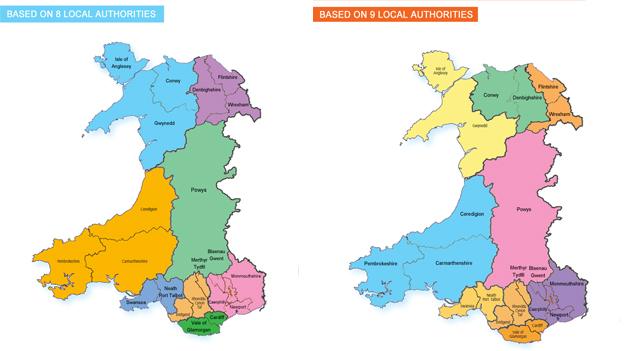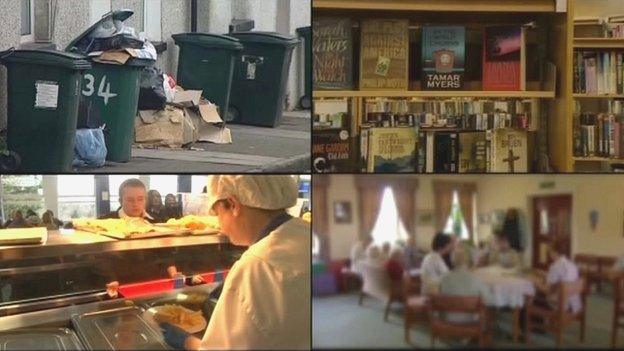Plans to cut Welsh councils cause split in north
- Published

Radical plans to cut councils in Wales from 22 to eight have been published. A big question remains over future changes in north Wales. Should the region be re-organised into two or three authorities? Tom Bodden takes a closer look at reaction and opinion north of Powys.
North Wales council chiefs are split over radical plans to carve the region up into two or three authorities, as unions warn of job cuts and privatisation.
Public Services Minister Leighton Andrews insisted the case was "compelling and widely accepted".
But opposition is widespread and varied, even within his own party.
Aaron Shotton, Labour leader of Flintshire, wants more devolved power to councils and major reform of the ailing financial structures.
"Mergers alone are not radical enough to cope with the financial pressures facing councils over the next three years alone," he said.
Flintshire deputy leader and Labour councillor Bernie Attridge called the plans "political suicide", adding Welsh Labour needed "urgent change at the top".
Remote
Wrexham council's leader, independent councillor Mark Pritchard, said Welsh ministers had been "foolish and rushed" in their plans and were taking the people for granted ahead of next year's assembly election.
"Senior politicians are sitting in ivory towers in Cardiff and lack respect for local democracy.
"I would ask the people of Wales if you had £400m to spend where would you use it, on council reorganisation or in schools, swimming pools, and hospitals? I know which I would pick."
Anglesey council was placed under special measures by the Welsh government for two years in 2011, after years of political infighting, and the minister told AMs the island authority did not have an "elegant history".
But new independent leader of a reformed Anglesey Ieuan Williams claimed authorities covering populations of up to 300,000 would make local democracy remote.
"There is a lack of understanding among Cardiff Bay politicians, they think they can click their fingers and things happen but local government is far too complex for that," he said.
"The Welsh government needs to decide if it is for local democracy. We are in danger of becoming one of the most centralised countries in Europe."
Plaid stronghold
He questioned whether the proposed reforms would actually save money, and said the total costs could be around £300m, when authorities were struggling to achieve swingeing cuts in spending.
The future for the north is still uncertain with proposals suggesting either two super authorities comprising Gwynedd, Anglesey and Conwy in the north west, and Wrexham, Flintshire and Denbighshire in the north east.
An alternative allows further consultation over three councils, with Denbighshire joining with Conwy instead.
Leading councillors suggested that the two authorities proposal could deliver a Plaid Cymru stronghold to the west and Labour to the east.
Others questioned whether Gwynedd's policy strongly promoting the Welsh language could be put at risk from a merger with authorities with a less strict approach.

Council staff fear fear job losses and privatisation of services, unions say
'Greatest fear'
Geoff Edkins, Unison's regional organiser, said that estimates based on the Welsh Local Government Association's figures, warned of 15,000 workers in Wales facing redundancy in merged authorities, including around 4,000 in north Wales.
Wednesday's announcement has prolonged the uncertainty for the union's members in the north.
Financial pressures on council spending has already prompted some to look to close or to privatise services, he said, like libraries, leisure, welfare rights and home care.
"Whether the outcome is two or three authorities in north Wales is uncertain and will remain so till after the assembly elections and possibly up till 2020. Yet sticking as we are isn't tenable," he said.
"The greatest fear for our members is the loss of jobs and privatisation. They wonder just what services will be left to be merged."
'Glimmer of light'
Hugh Evans the independent leader of Denbighshire council said that merging the county into a new authority with Flintshire and Wrexham was his "worst fear realised".
Denbighshire and Conwy had reached a voluntary agreement for merger which was earlier rejected by Leighton Andrews.
But he is now suggesting that the arrangement could go out to consultation in a model of three new north Wales authorities.
Mr Evans said the scale of the two council models in the north would be a major concern and saw a "glimmer of light" in the further consultation.
"There are also the cultural and linguistic differences with the strong urban industrial areas against the rural areas, particularly in Denbighshire," he said.
"It should be about how best to deliver local services not about boundaries," he said, adding that the Williams Commission which drew up proposals for 10 or 11 authorities "seemed to be a complete waste of time and money".
No final decisions
"Two authorities would take communities further away from the decision makers. I would be really concerned. Haven't we learned the lessons of the Betsi Cadwaladr health board?
"This whole process is a distraction beyond 2020 when we should be concentrating on providing services."
But Dyfed Edwards, Plaid Cymru leader of Gwynedd council, said that reform of the map of local government was essential and needed political leadership in all parties.
He added: "Will someone please get on with it? If the status quo isn't sustainable, then tell us what is.
"I think personally one council for north west and one for north east Wales makes sense in terms of spatial planning.
"The big question is over health and social care, where we have a health board across the whole of north Wales."
Mr Andrews said no final decisions had been taken.
"The case in north Wales is finely balanced between two or three local authorities. We therefore feel that there is a case for a further debate and would welcome views," he said.
"I want to emphasise this is not a final decision. It is the next phase in our public debate."
- Published17 June 2015
